Game Reviews
Assassin’s Creed Origins– A Series Saved from the Brink of Death

Assassin’s Creed Origins Review In Progress Part 1
My initial impressions of Assassin’s Creed Origins were unreservedly glowing. Having spent some more time as Bayek, the wayward Medjay, on his quest to thwart a sinister conspiracy that threatens to plunge Egypt into utter chaos, it’s fair to say that my opinion hasn’t changed. The game has only improved as it’s progressed and has remained continually impressive in its consistent provision of high quality and high quantity gameplay experiences. Ubisoft might have just accomplished the gaming equivalent of solving the riddle of the sphinx when it comes to how they’ve blended a deft awareness of the mechanical necessities of a vast open world with the requirements of a well-paced narrative. The company has had a lot of practice in recent years. For most of the last generation as well as this one if you were to describe the latest Far Cry title as a “Ubisoft game” then people would instantly know what that meant.
It’s more than expected that Ubisoft can deliver a competently executed open-world game. Indeed, the Assassin’s Creed series itself is the largest contributor to their reputation but such success can often be a double-edged sword. The gameplay elements that Ubisoft has made industry standards mean that every new game has a certain immediate familiarity; a familiarity that can turn to fatigue. Even a setting as refreshing as the 18th century Caribbean in the Golden Age of Piracy as featured in Black Flag was not enough to stave off it off entirely. If the previous two games could be considered test-beds then Assassin’s Creed Origins is more than proof that the experiments of Unity and Syndicate were worth it. Refinements have been made across the board with every aspect of the established formula that fans have come to love being upgraded and tweaked in some fashion. The result is a game that stays true to its franchise heritage even as it simultaneously reinvents itself to provide what might just be the best open-world experience since Horizon Zero Dawn.
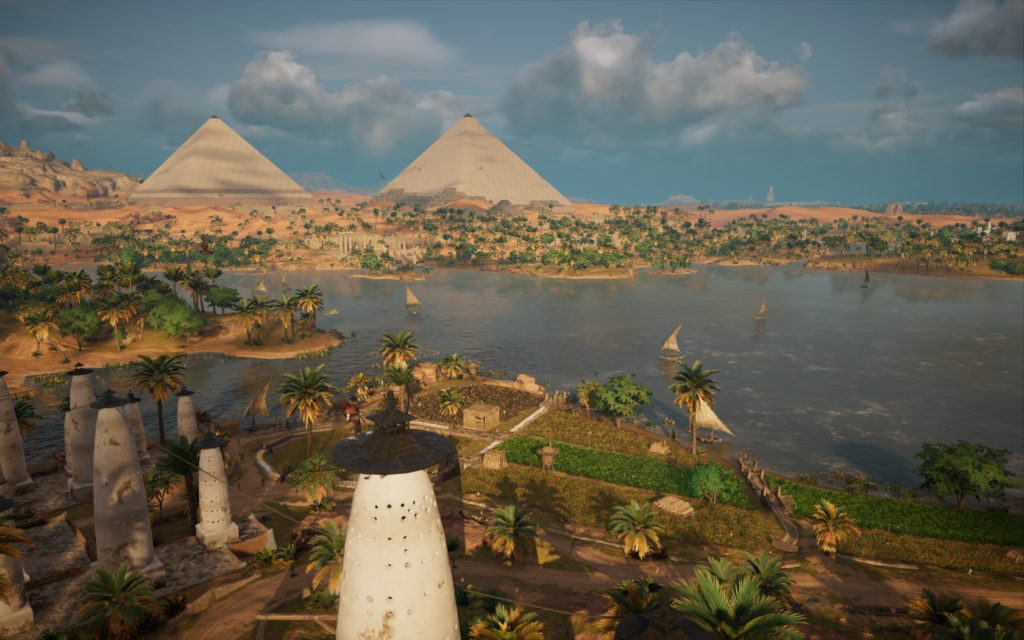
The AnvilNext 2.0 engine has been at the core of the last two games in the series and after some distressing and hilarious missteps, it seems that Ubisoft has finally discovered what it’s capable of. Playing at max settings on a PC with an i7-7700 3.60GHz processor, 16GBs DDR4 memory, and a GTX 1070 graphics card, I encountered no problems with the game beyond a few audio dropout and frame dip issues that were confined to cutscenes. Although they were a little jarring since they had no impact on the fluidity of gameplay it was easy to overlook them. That said I did see an upside-down chariot whirling through the streets of Memphis like a demented spinning top, as well as a man, stood waist-deep in water staring with deadly intent at the prow of a boat. Bugs like that should obviously not be present in a modern AAA title but in all honesty, I find them more endearing than off-putting. No open-world game is complete without one or two belly laugh-inducing glitches, as Bethesda fans well know.
The in-game graphics options are comparable to those available in most modern PC titles but when it comes to anti-aliasing you can only switch between presets rather than selecting the exact type you prefer. A minor gripe but one worth mentioning for those who want total control over their exact display settings. Players with mid-range set-ups are probably looking for performance results at or above the current generation of consoles. After the horrendous debacle that saw Unity largely unplayable at launch, Ubisoft Kiev (responsible for converting most of the company’s PC releases) have gone above and beyond in doing their part in bringing to market an aesthetically stunning open world that could give even Uncharted: The Lost Legacy a run for its money. No matter what you’re doing or which way you turn, Assassin’s Creed Origins is so flawlessly beautiful that your eyes will devour the scenery like ravenous scarab beetles. The attention to detail and sense of verisimilitude is astonishing. Whether it’s a flock of flamingos launching themselves out of a shimmering lake, a field of flowers stirring gently in the balmy evening breeze, twirling coils of sand wafting over the surface of scorching dunes, or crowds of civilians going about their lives in the shadows of towering stone edifices studded with torches that flicker like the stars overhead, every corner of the game world is presented with immaculate skill.
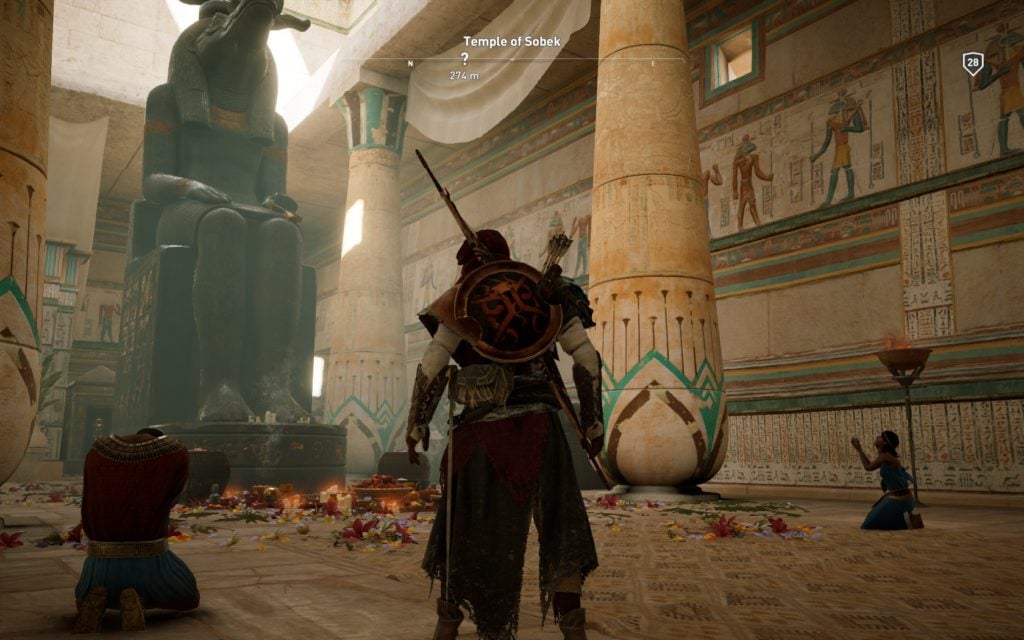
It’s a common misconception that deserts are barren and arid places devoid of any life or movement save the skittering of shadows and the searing wind but like a tapestry brought to life, Ubisoft’s vision of Ptolemaic Egypt is a glorious symphony of vivid color that doesn’t just put that misconception to rest but builds it an entire tomb complex, carves it a sarcophagus, and surrounds it with glittering treasure. Granted, large swathes of the game world are dominated by intimidating stretches of empty wilderness but they’re far from being uniform expanses of featureless sand. These wastelands shimmer in the sunlight a dozen shades of terracotta, auburn, and ocher which by day turns them into heaving oceans of liquid gold and by night into a velvet canvas laced with threads of moonlight.
In the course of your wanderings, you’ll travel through many towns and cities including Alexandria, Memphis, and Heraklion all of which give new meaning to the term wonder of the world. Surrounded by the lush fields of crops and lily-clogged waterways each of these cities bombard you from all directions with intense bursts of red, purple and blue as banners hung from stark white battlements flutter in the breeze above streets lined with baskets of plump fruits, bolts of silk, and sheets of dried spices. In less careful hands such a melange of color could have easily become overwhelming, but Ubisoft Montreal are not beginners and their work has the indelible mark of a master craftsman. Instead of an assault on the senses, Assassin’s Creed Origins makes judicious use of bold color contrasted against the natural tones of the landscape to bring vigorous life to a place that most people associate with crumbling stone and faded scraps of papyrus.
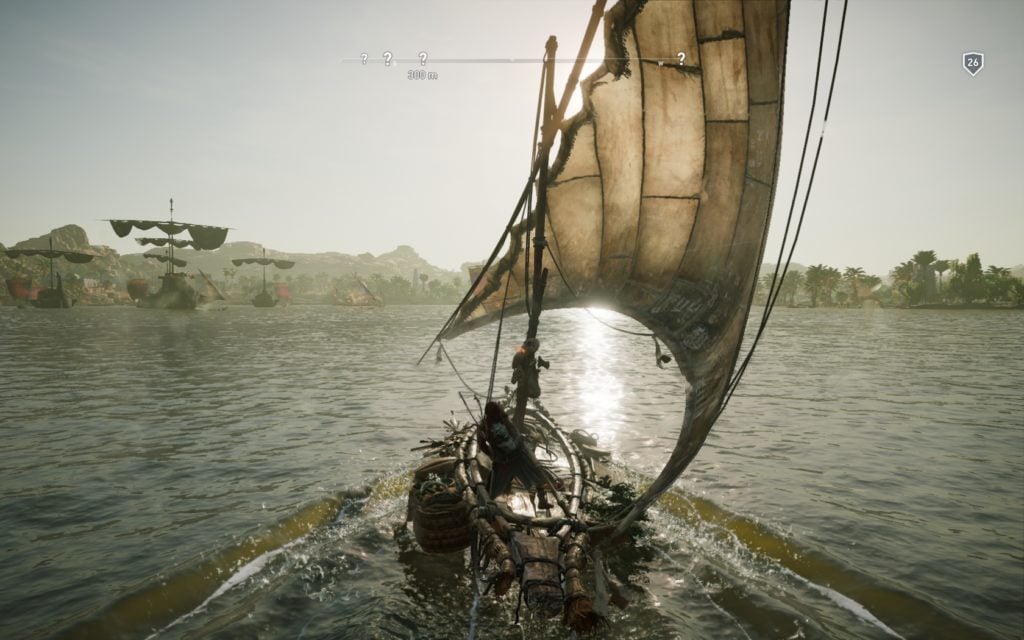
The world that Ubisoft has built for this installment is unfailingly gorgeous, but it’s a beauty that’s far more than skin deep. Sarah Schachner returns to the series as principal composer after her standout work in Black Flag and Unity. Her use of undulating synths counter-pointed by robust orchestral motifs creates an expertly keyed soundtrack that sounds like a combination of Giacchino’s domineering but intoxicating pieces from Fringe and Djawadi’s achingly poignant work on Game of Thrones, with just a hint of Pawel Blaszczak’s soundtrack to Dying Light. It’s a bewildering mixture that hits the ear like an auditory sirocco which alters in intensity to match the onscreen action, from furious combat to sneaky sight-seeing, in a virtuoso fusion of sound and vision. Coherent sound design and a thematically appropriate score are fundamental constituent elements of a game, even if they are often overlooked, so it’s a pleasure to play a game that makes such adept use of its audio components to accentuate and complement the gameplay experience. Sound effects are no less high quality and there’s some absolutely exceptional Foley work on display here. I’ve yet to encounter an out of place footstep or miscued atmospheric effect. Not since Alien Isolation has I encountered such an authentic and effective sound design.
As impressive as the overall world and location design is, it’s the gameplay opportunities they enable that is the metaphorical sauce for the ibis. Since the series began, each protagonist’s individual quest for murderous justice has taken place against the backdrop of supplementary missions that flesh out the main narrative. These side quests and activities have always been as varied as possible within each installment’s design constraints, but Assassin’s Creed Origins makes use of the entire toolkit that Ubisoft has created over the years to construct a gaming experience that is much more than the sum of its parts. Each new location you discover serves as a hub around which are clustered various points of interest (military camps, bandit hideaways, animals lairs, etc) that you’re free to discover on your own but are usually the focal points of particular side missions. Many open worlds try and fail with such a loosely structured format, as exemplified by Dragon Age: Inquisition, in part due to excessive repetition. I’m not implying that every mission or objective in Origins is entirely unique, in a game of this size there is bound to be repetition to a certain extent, but what keeps the content from becoming stale before its time is that the places it takes place in are individually crafted and specific to that particular area of the map.
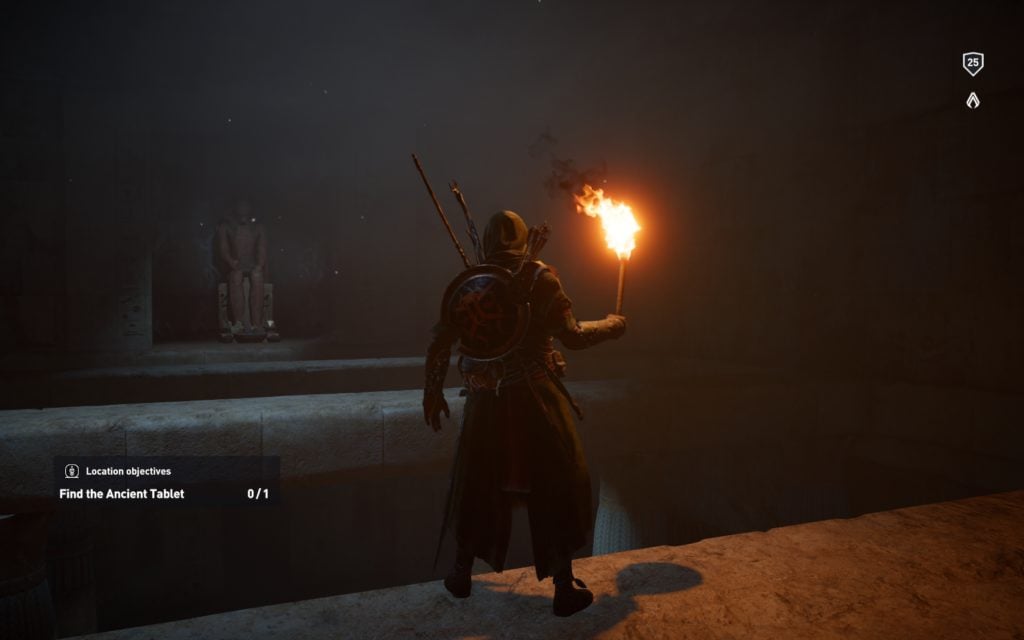
Quests will take you into dank cave networks that open up into collapsed tombs filled with royal treasure, poacher camps festooned with dismembered animal corpses, burial chambers choked with bones and dust, and shadowy palaces where soldiers guard the secrets of their masters. In certain portions of the game, you’ll even take to the high seas as the naval combat that was such a highlight of Black Flag and Rogue makes a spectacular comeback, and sees you take command of a Greek trireme in a few mission segments. You can participate in chariot races at the Hippodrome in Alexandria or in gladiatorial combat in the arenas of Krocodilopolis and Cyrene that pit you against a series of increasingly difficult opponents. I’d say it was a shame that there were so few of these changes of pace but if more were included then they might have overstayed their welcome. As it stands they’re a welcome diversion from the majority of the gameplay and make sure that no two play sessions of Assassin’s Creed Origins will ever be exactly alike.
Most of your time with the game will be spent either traversing the world or engaged in combat. The Assassin’s Creed series is first and foremost known for its franchise-defining combination of parkour-inspired movement system and its stealth-oriented combat, and like every other aspect of the game, these have seen significant improvements. Movement has always been a key focus for the developers when it comes to these titles, with each release making character control increasingly liberating. Climbing almost impossible surfaces, leaping between buildings, and skulking through the underbrush has never felt better than it does in Origins. Bayek’s movements have a greater feeling of flexibility, strength, and precision than any of the previous protagonists. This carries over into combat with the paired animation system used in previous titles replaced by a style more akin to something that you might find in a Soulsborne game. It’s much less hardcore and unforgiving of course, but at least you can’t just roll at bosses until they die.
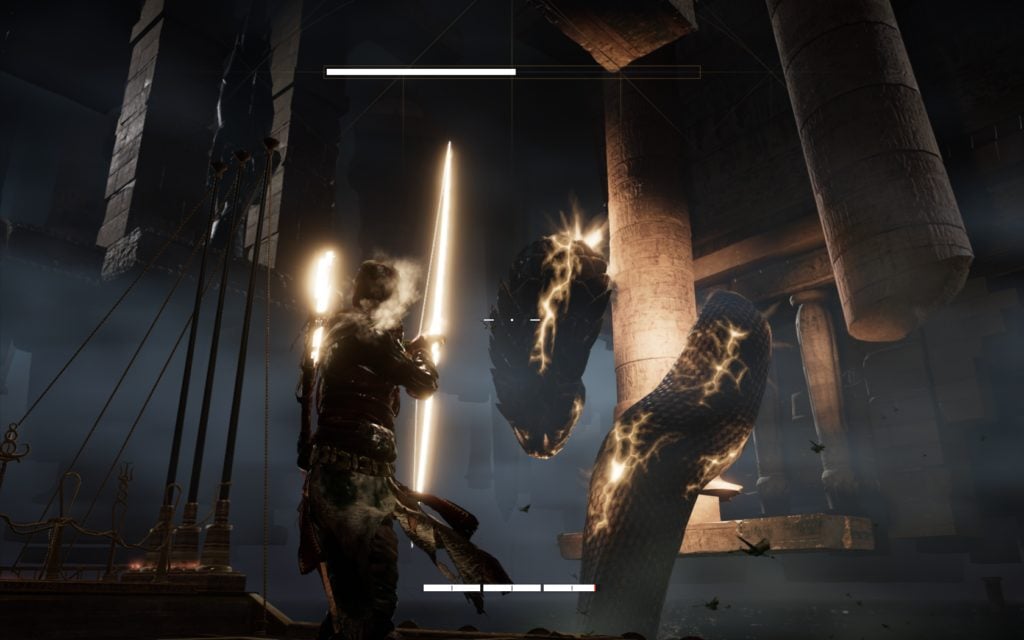
This departure from the former combat mechanics can make fight sequences seem less elegant and sophisticated. However, what’s gained in exchange is a deeper sense of control of the engagement and situational awareness that turns each encounter into a grisly dance. Players are free to move in whatever direction they see fit, switch targets on the fly, and take advantage of moment-to-moment changes in the fight as they occur. Since you’re no longer locked into battle with one enemy at a time you’re able to take advantage of environmental factors such as wandering animals or rebel patrols that can be lured in to attack your foes; or urns of oil that once ignited can incinerate entire camps full of enemies before they even know you’re there. Speaking of, stealth is very much on the back seat in this title but that’s not entirely a bad thing.
A lot of the situations that required stealth in previous Assassin’s Creed games often felt incredibly forced. A situation that wasn’t improved by some mission-critical characters having auras around them that instantly resulted in detection and failure. Bayek isn’t forced to obey such arbitrary restrictions which makes stealth an optional extra, one that adds tactical nuance to each engagement as you poison targets from a distance to thin their numbers or quietly exterminate them one by one with well-placed knife strikes. On the whole, combat isn’t treated as a punishment for failing to remain undetected but rather as an unavoidable consequence of jumping down from a rooftop and putting a knife through your target’s throat. By giving Bayek a wide variety of weapon choices and abilities that enhance specific aspects of battle, Ubisoft is encouraging players to experiment with a variety of different play styles that give combat a surprising amount of complexity and depth.

With thirty hours spent so far in Assassin’s Creed Origins, I’ve completed the main story and explored half the map, which by the looks of it offers at least another ten or so hours of solid exploration and gameplay. That’s actually varied activities, not the busywork collectathons that some of the earlier games in the series devolved into. Going off that alone it’s more than worth a purchase if you look at it in pure per-hour terms. From a technical and gameplay perspective Assassin’s Creed Origins is a veritable tour de force, one that not only revolutionizes the franchise but will likely make more than a few ripples in the open-world genre itself. But that’s not the main reason I’d suggest adding this game to your collection. For that, you’ll have to wait until part two of my review in progress, where I’ll discuss the game’s story and deliver my final verdict.

-

 Features4 weeks ago
Features4 weeks agoDon’t Watch These 5 Fantasy Anime… Unless You Want to Be Obsessed
-

 Culture3 weeks ago
Culture3 weeks agoMultiplayer Online Gaming Communities Connect Players Across International Borders
-

 Features3 weeks ago
Features3 weeks ago“Even if it’s used a little, it’s fine”: Demon Slayer Star Shrugs Off AI Threat
-

 Features2 weeks ago
Features2 weeks agoBest Cross-Platform Games for PC, PS5, Xbox, and Switch
-

 Game Reviews4 weeks ago
Game Reviews4 weeks agoHow Overcooked! 2 Made Ruining Friendships Fun
-

 Features2 weeks ago
Features2 weeks agoThe End Is Near! Demon Slayer’s Final Arc Trailer Hints at a Battle of Legends
-

 Features3 weeks ago
Features3 weeks ago8 Video Games That Gradually Get Harder
-

 Game Reviews4 weeks ago
Game Reviews4 weeks agoHow Persona 5 Royal Critiques the Cult of Success
-

 Features2 weeks ago
Features2 weeks agoDon’t Miss This: Tokyo Revengers’ ‘Three Titans’ Arc Is What Fans Have Waited For!
-

 Guides2 weeks ago
Guides2 weeks agoHow to buy games on Steam without a credit card
-

 Game Reviews2 weeks ago
Game Reviews2 weeks agoFinal Fantasy VII Rebirth Review: A Worthy Successor?
-

 Uncategorized3 weeks ago
Uncategorized3 weeks agoSleep Meditation Music: The Key to Unwinding






















